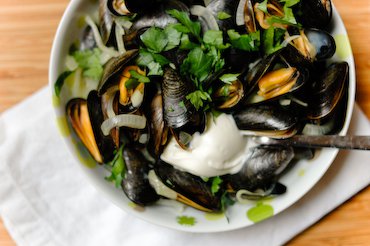
After posting a few thoughts on sustainable seafood and how each of us can make a difference, it grew apparent that one proactive way food bloggers can help, beyond spreading the word and trying to make responsible choices themselves, is to offer recipes featuring those varieties of fish or shellfish that are more eco-friendly.
This happens to be the very premise of Teach a Man to Fish, an event created by Boston writer Jacqueline Church to raise awareness about this issue. If you’d like to play along (you don’t need to have a blog), you have until the end of October to do so; check Jacqueline’s blog for more details.
Update! Here’s the event round-up.
Why did I choose to feature mussels? Well, for starters, farmed mussels* are in the YES! column of my pocket seafood guide. (Get yours today!) What’s more, they are in season now and until the end of winter, and, although delicious, nutritious, and easy to prepare, most people find them a tad intimidating — live mollusks and all — and therefore do not place them very high on their must-cook list.
For the longest time, I myself didn’t really understand mussels.
I didn’t enjoy the flavor, or the texture, or the sticky juices that run down your wrists when you eat them, and I just didn’t see the point. When Maxence and I first started seeing each other, many springs ago, we would sometimes eat at a chain restaurant from Brussels that has outlets near most Paris cinemas, and where mussels are, of course, the house specialty. While Maxence ate a big bowl of them, I would dine on a Belgian waffle with chocolate sauce and vanilla ice cream — a win-win arrangement if I’ve ever seen one.
But then my taste buds grew up, mussels grew on me, and by the time we decided to spend a weekend in Brussels, I was 100% sold on his idea to eat mussels at every meal, and we practically did.
The mussels I buy from my poissonnier are bouchot mussels** from the Mont Saint-Michel bay, which is technically in Brittany although the Mont Saint-Michel itself belongs to Normandy, but if you wish to avoid tempestuous arguments and kicks in the shins, I suggest you not raise the matter with a Breton or a Normand, ever.
Sold under the snappy label of “Moules de bouchot de la baie du Mont Saint-Michel AOC,” these mussels are protected by the French certification of origin, and were the very first sea creatures to be granted such a status, in 2006.
This recipe is inspired by the über-classic moules marinière recipe, which has you cook live mussels in a broth of dry white wine with shallots, herbs, butter, and a little vinegar till they give up the ghost and open wide.
I wanted to make a slightly more festive variation, so I flavored the broth with saffron (the mussel’s best friend; I buy mine for a reasonable price at Goumanyat). And because I happened to have leftover Champagne in the fridge (I know some find this hard to picture but there you are), I used it in place of regular white wine. However, you could absolutely omit the saffron and use another type of dry white wine, sparkling or not: I’ve made the recipe that way before and it is, in truth, just as good.
The easiest, and most satisfying way to eat mussels is to use one empty shell as a pair of tongs to grab and pull out the meat of another mussel. It is hence a considerate idea to provide each guest with a large napkin, and a rince-doigts, a small cup filled with warm water and a slice of lemon, in which to rinse his fingers.
~~~
* In French, mussel farming is called la mytiliculture; oyster farming is ostréiculture; shellfish farming in general is conchyliculture, which sounds like an obscure insult.
** Une moule de bouchot is a mussel that’s been raised on a bouchot, a wooden pillar around which a thick rope spirals: the mussels afix themselves to the rope, and live in and out of the water alternatively as the tide rises and recedes.
Continue reading »






